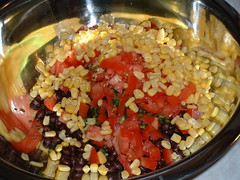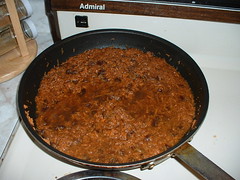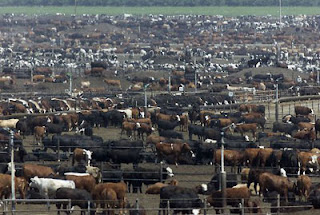So, let’s not forget, the European Union has banned North American beef from its market since the late 1990’s – the reason being that American and Canadian beef producers still use antibiotics and steroids that were banned in Europe as unsafe. Some of the substances destroy your immune system, some are outright carcinogens which will give you cancer.
Here’s another problem with North American beef.
Hormone-treated beef eaten by moms linked to fertility woes in sons: Medical study. 'A large potential for concern,' scientist says
28 March 2007
Montreal Gazette
PARISHormone-treated beef may be linked to low sperm counts and borderline fertility among U.S. men, according to a first-ever study that appears today in a medical journal.
The paper says men whose mothers were big eaters of beef - most of which is treated with hormones in the United States to accelerate cattle growth - have lower fertility levels compared with those whose mothers ate less or no beef.
It is the first peer-assessed investigation into the effect of food on the human reproductive system, its authors believe.
U.S. farmers have been using hormones to promote muscle growth in cattle for more than half a century.
The European Union outlawed the substances in 1988 on health grounds, triggering a huge trade row with the United States. The World Trade Organization is to issue a technical ruling on the dispute on April 17, a European Commission source said.
The study looked at 387 U.S. men born between 1949 and 1983 who were interviewed about their childhood background and their history of fertility and were asked to give a sperm sample.
Sons of women who ate more than seven beef meals a week had a sperm count that was nearly 25 percent lower than men whose mothers ate less beef.
And they were nearly three times likelier to have sperm concentrations that fell below the WHO threshold of sub-fertility. The more beef the mother ate, the lower the son's sperm quality.
"These data suggest that maternal beef consumption, and possibly xenobiotics (foreign chemicals) in beef, may alter a man's testicular development in utero and adversely affect his reproductive capacity," the study says.
The paper appears in Human Reproduction, the journal of the European Society of Human Reproduction and Embryology.
"When you disrupt hormones prenatally, you affect a whole cascade, and in particular, oestrogens and androgens affect testicular development," lead author Shanna Swan, a professor at the department of obstetrics and gynecology at the University of Rochester, New York, told AFP.
The "plausible hypothesis," which is also supported by previous work on lab rodents, is that hormones are the cause, Swan said. She stressed, though, that this was not a definitive conclusion and that further work, such as assessing the fertility of European men born after 1988, was needed.
The present evidence "is certainly not robust enough to affect regulations or even public-health action but it is robust enough, I think, to say that we have to have further studies," she said.
"Together with animal data, it suggests there is a large potential for concern here. I don't think we can assume that these products are risk-free."
In 1979, the FDA withdrew use of diethylstilbestrol, the synthetic hormone for cattle, eight years after it was banned for use by pregnant women following evidence it damaged male and female reproductive systems.
Other hormones are still widely and legally used in United States and also Canadian meat production: three are natural steroids (oestradiol, testosterone and progesterone) and three are synthetic (zeranol, trenbolone acetate and menegestrol acetate).




